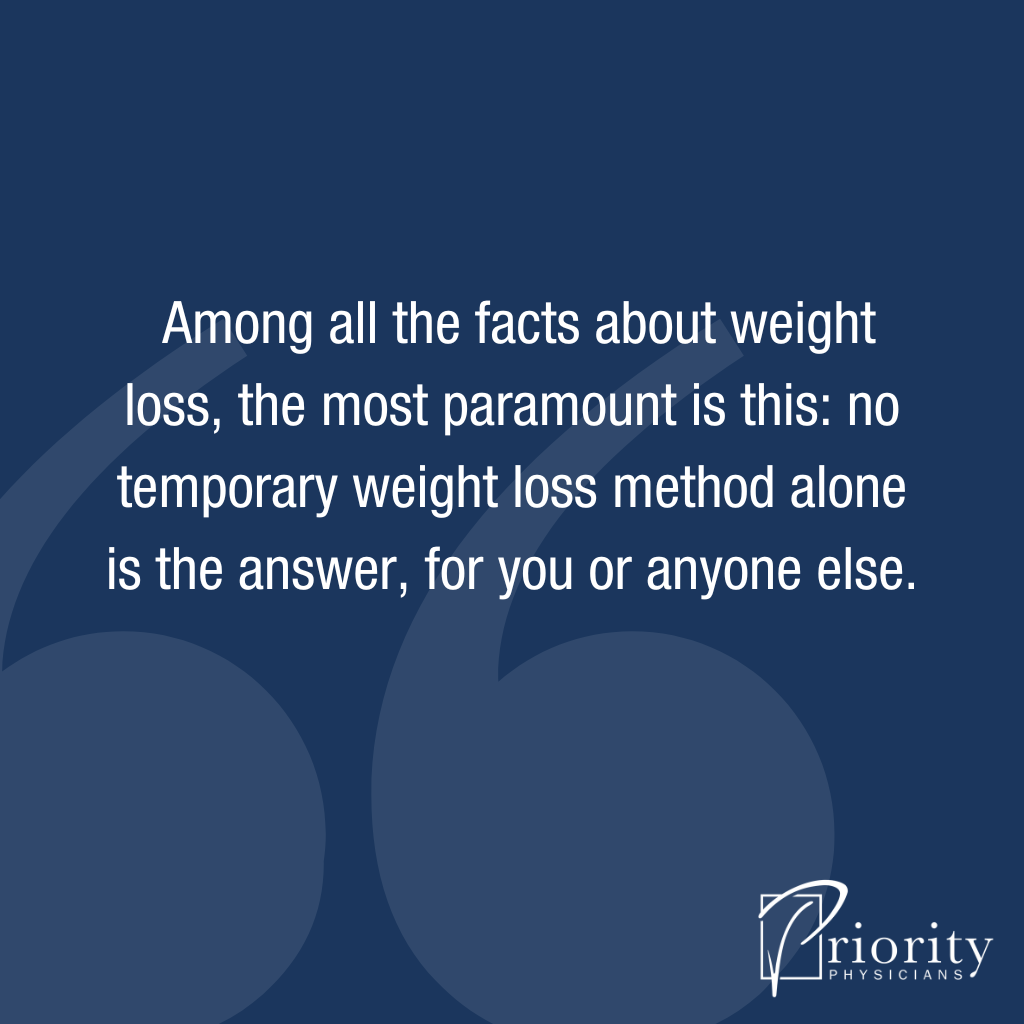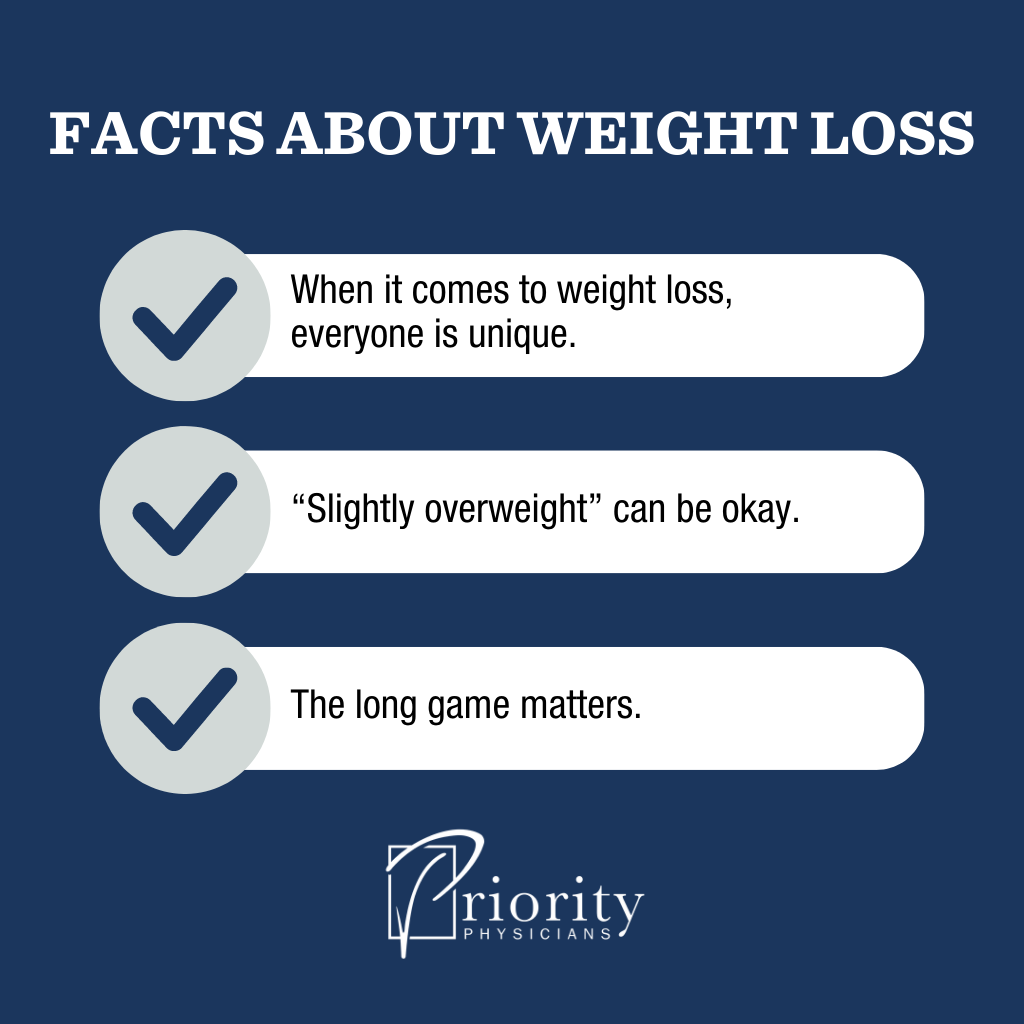Do you wish you could lose a few pounds? Maybe more? You’re not alone.
More than half of Americans say they’d like to lose weight, yet only 26% are actively trying to do so, according to a recent Gallup poll.
If you’re among that 26%, you know weight loss can be challenging. You’ve likely faced a bewildering array of diets, fads, trends, and meal plans. Maybe you even successfully reached your weight goal, then — like many other dieters — watched the pounds creep back.
Among all the myths and facts about weight loss, the most paramount principle is this: no temporary weight loss method alone is the answer, for you or anyone else. Rather, you must adopt a change in mindset and lifestyle — and stick with that change permanently.

Key Points About My Weight Loss Journey
I once managed my own personal weight loss of 90 pounds in one year.
During my time as a medical resident, I was overweight and suffered from high blood pressure and low energy. Realizing a change was needed, I created my own diet plan, began an exercise program, and lost most of those 90 pounds in my first six months of effort.
To this day, I maintain that healthy lifestyle. It’s still delivering positive results. I struggle at times and find myself slipping every once in a while, but as long as I stay mindful and true to myself, I’m able to overcome obstacles and stay focused.
When I was asked to direct a weight loss clinic, my background as a primary care internist was valuable. But just as relevant was the experience I’d gained formulating and managing my own successful weight loss plan.
Key Points About Weight Loss
My personal transformation gave me the drive to help others achieve the same. Running a weight-loss clinic was eye-opening. I observed not just what works for most people, but also what doesn’t.
Let’s explore a few key points about weight loss that we consider at Priority Physicians as we guide our patients to lose weight and keep it off:
- When it comes to weight loss, everyone is unique. Exercise and caloric intake are important, but weight loss is about more than calories in and calories out. Other factors and variables — like a person’s muscle mass and metabolism — should be considered as well. The key here: Any weight loss approach must be tailored to the individual.
- “Slightly overweight” can be okay. Carrying a little extra weight doesn’t automatically make you “unhealthy.” And even though your body mass index (BMI) may indicate that you’re slightly overweight,losing that excess weight won’t necessarily improve your health, especially if you’re losing muscle mass rather than fat.
- The long game matters. Sporadic dieting and meal plans may work in the short term, but weight management requires ongoing effort. To keep the weight off, find a sustainable lifestyle that sets you up for long-term success.

The Right Approach for You
At Priority Physicians, we start by working with you to choose a healthy approach to eating. For example, the Mediterranean diet — with its focus on lean proteins as well as healthy fats like olive oil, avocado, and nuts — is effective for most people. Besides offering beneficial nutrients, it can lower cholesterol, reduce blood pressure, and help you feel full.
Together, we identify the right dietary approach for your specific body type, metabolism, and needs. Then we help you determine other changes to your lifestyle, including an exercise program, that will support your weight loss in the long term.
Sometimes it’s also helpful for your physician to explore with you any emotional or psychological factors that may drive overeating or affect your weight loss efforts.
Staying Healthy During Weight Loss
Most people decide to lose weight for physical reasons. At Priority Physicians, our main goal with weight loss is to improve overall physical and mental health.
Exercise and an improved diet create favorable chemical and hormonal shifts within the body. Managed properly, weight loss can help correct several medical issues, from high cholesterol and type 2 diabetes to hypertension. Maintained over time, weight loss may eliminate the need for certain medications, and even curb symptoms of depression and anxiety.
Of course, we want to ensure you stay in good health as you’re losing weight. Although BMI is sometimes used to help gauge an individual’s health during weight loss, we’ve found an even more effective alternative: bioelectrical impedance for body composition analysis.
In our practice, we make use of InBody Body Composition Analysis, which uses bioelectrical impedance to divide your weight neatly and accurately into components that help us assess your health and nutritional level.
InBody very accurately measures:
- Muscle mass: The stronger you are, the better your chances of maintaining good health. Through body comp analysis, we ensure you’re not losing muscle as you lose fat.
- Body fat percentage: Fat tissue secretes hormones, and excess hormone secretion can disrupt the body’s equilibrium — so percent of fat is helpful to know and track.
- Basal metabolic rate: This rate represents the number of calories you burn every day at rest. Unusual shifts in basal metabolic rate may point to a potential physical issue.
- Total fat mass: This indicator notes actual pounds of fat, a simple measure that makes it easy for you to follow your weight loss progress.
- Visceral fat: Levels of this type of fat, which surrounds your organs, can be an effective long-term predictor of cardiovascular disease and abdominal cancers. It’s possible for you to lose a lot of body fat yet retain visceral fat, so it’s prudent to monitor these levels.
With regular use of body comp analysis, we support your good health as the pounds come off. Then, working with you, we adjust your weight-loss program as needed to bring you the best long-term results possible.
Key Facts About Weight Loss: The Takeaway
If you struggle with weight, perhaps the most honest thing I can tell you is that the struggle will always be there. I speak from personal experience: Weight loss calls for constant mindfulness and a committed investment of your time and effort.
At Priority Physicians, we care about your weight loss journey and understand that the journey can last a lifetime. If you enjoyed these facts about weight loss, reach out to our board-certified physicians for help toward real, sustained change.

